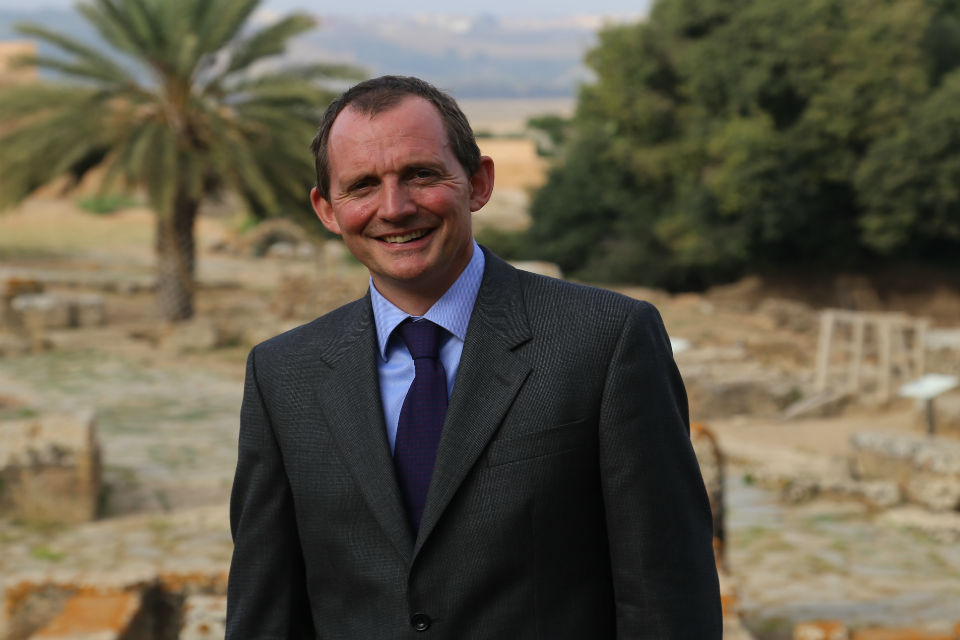Op-ed by new British Ambassador to Morocco Mr Thomas Reilly
Mr Thomas Reilly has been appointed Her Majesty’s Ambassador to the Kingdom of Morocco in succession to Ms Karen Elizabeth Betts.

My first visit to Morocco was in 1998. I liked the country so much that I came back again in 2000. Those two visits left me with a tremendously positive impression of a country rich in history, culture and diversity. Little did I think that I would be back here nearly 20 years after my first visit as the British Ambassador.
It is a huge honour and a privilege to act as the representative of the UK in Morocco. I am delighted to be here now and to arrive during Ramadan is an additional blessing. Over the years, I have enjoyed Ramadan in Jordan, Kuwait and Egypt and I am looking forward to sharing it in Morocco too, as well as to learning more about Morocco during my time here. My family (who are not yet with me in Rabat) are also very excited to be moving to Morocco and are looking forward to living and learning here.
That the Morocco/UK relationship is a strong and enduring partnership, is clearly demonstrated by the fact that it is already more than 800 years old. As British Ambassador, I will be following in the footsteps of innumerable predecessors, dating back to the formal establishment of diplomatic relations when Her Majesty Queen Elizabeth I sent her Ambassadors to the Court of Morocco’s Saadi Sultanate. In exchange, Sultan Ahmed al-Mansour sent his Principal Secretary, Abd el-Ouahed Ben Massaoud as Moroccan Ambassador to the Court of Queen Elizabeth. This appointment has had a lasting impact on British culture - Abd el-Ouahed Ben Massaoud is reputed to have been the inspiration for Shakespeare’s hero, Othello. Queen Elizabeth I spoke of Morocco in very warm terms - “The great friendship and cooperation that exists between our Crowns” – a warmth and closeness between the monarchies of both our countries that endures to this day.
That Royal relationship is replicated across our societies - each year more than 600,000 British tourists visit Morocco, drawn by the history, culture, geography, climate and most importantly by the warmth and generous hospitality of the people of Morocco. One of my ambitions for my time here in Morocco is to encourage even more British tourists to visit and have the chance to explore and get to know this unique Kingdom and its people.
The UK and Morocco also enjoy close commercial ties, with bilateral trade worth more than $2 billion each year. The UK is among the top six foreign investors to Morocco. Another of my priorities is to foster an ever closer partnership between Moroccan companies and their British counterparts to further strengthen these commercial ties and increase bilateral trade through mutual support in niche commercial areas.
One of those niche areas is renewable energy, where there are some very exciting opportunities. Morocco aims to increase its renewable electricity generation to 52% of energy demand and to reduce greenhouse gas emissions to 32% by 2030. These goals clearly demonstrate Morocco’s ambition and drive in this sector and the potential to become a global leader in the sustainable and renewable energy sector. In this context, the city of Ouarzazate, renowned as the location for the filming of Lawrence of Arabia, is pioneering a revolutionary solar power station, one of the largest of its kind in the world. The UK also has substantial experience in renewable energy and in regulating energy markets. Morocco also needs gas for its power stations and British companies are well-placed to work with Morocco to meet this need.
UK diplomatic policy in North Africa is focused on building a secure, peaceful and prosperous region, underpinned by shared values of human rights and democracy. This policy aim is supported by a number of projects in which Morocco is a key partner. For example, earlier this year the Westminster Foundation for Democracy (WFD) and the House of Councillors of the Moroccan Parliament signed a Memorandum of Understanding whose objective is to support the Parliament in upholding human rights, share public policy evaluation experiences and help Morocco’s Parliamentary Research Centre build its capacity.
Another area of shared interest is education and academia. I am looking forward to working with Morocco on building deeper academic and educational links between our two countries. The UK is home to some of the best universities in the world and we are proud to share them with Morocco’s future leaders through our Chevening Programme, through which Moroccan students have the opportunity to study at Universities all over the UK. So far, over 160 talented Moroccans have benefitted from this great initiative and I hope very much to increase that number during my time as Ambassador.
The relationship between our two countries today is in many respects stronger now than it has ever been and I look forward to building on this relationship to continue to develop an even closer partnership of equals across the different sectors which bind Morocco and the UK so closely together.
I would like to close by taking this opportunity to wish you a happy, blessed and above all peaceful end of Ramadan and a happy Eid.
Updates to this page
-
Added translation
-
First published.